x402 Behind the boom, how does ERC-8004 build the trust foundation for AI agents
1. Introduction: From x402’s Market Buzz to the Launch of ERC-8004
The x402 protocol, designed for automated micropayments among AI agents, has recently become a focal point in the market, sparking ongoing debate about its early potential. Yet beneath x402’s spotlight, a more fundamental standard—ERC-8004—has quietly captured the attention of industry insiders.
This raises a critical question: If x402 is already tackling payment challenges, what role does ERC-8004 play? Are they competing standards?
The answer is likely no. Instead, they function as two elegantly designed, complementary components in the commercial architecture of AI agents.
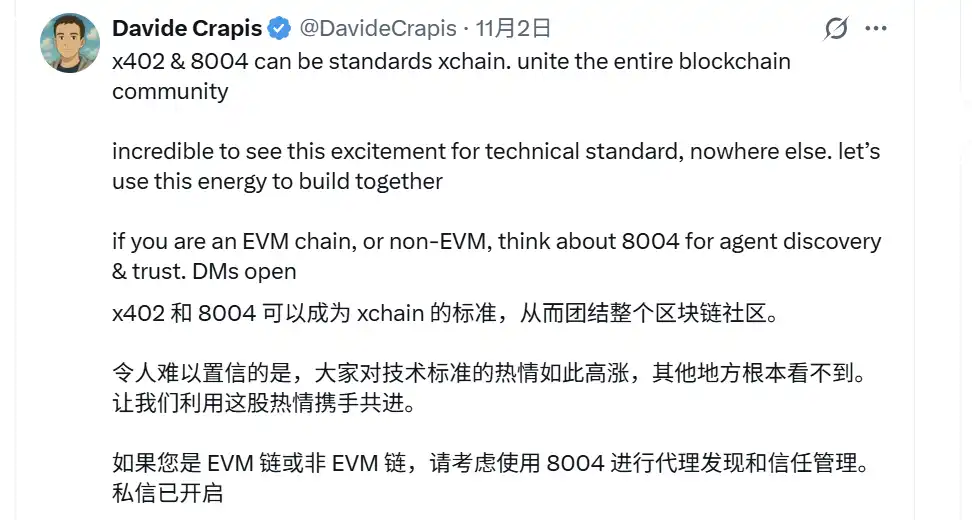
Source: X post by Davide Crapis, Head of AI, Ethereum Foundation
Notably, Erik Reppel—the creator of x402 and a Coinbase representative—is also a key signatory of the ERC-8004 protocol. Other signatories include core members from MetaMask, Google, and the Ethereum Foundation. This concentration of expertise and significant personnel overlap indicates the two protocols are not rivals but are jointly building a broader vision.
The details show that while x402 demonstrates the enormous demand for AI agent payments, ERC-8004 delivers the core foundational element needed to construct a robust machine economy. It addresses the critical challenge x402 alone cannot solve—how trust is established within an autonomous AI agent ecosystem. The Bitget Wallet Research Institute explores this topic further in the article below.
2. The Trust Challenge in Agent Collaboration: x402’s Unsolved Dilemma
In commercial interactions between AI agents, payments (the issue solved by x402) represent only the final step in the transaction cycle. A deeper question comes first: How can one agent be certain that another agent it hires is trustworthy? Put differently, how does an agent prove it can fulfill the required task?
Addressing this requires examining the underlying framework of agent commerce. According to Ethereum Foundation’s Davide Crapis, a decentralized AI agent business system must rest on three pillars: Discovery, Communication, and Computation.
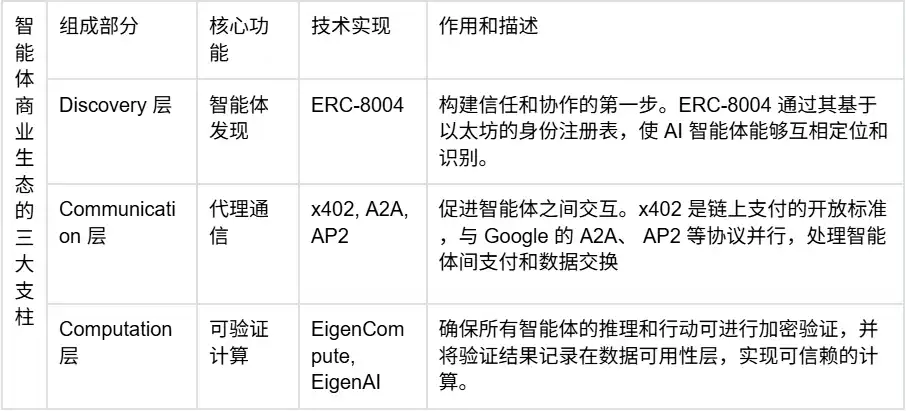
Source: X repost by Davide Crapis
The table above highlights that the x402 protocol primarily solves payment standards within the communication layer but fails to address critical issues like identity verification and reputation assessment. Before any payment occurs, agents must be securely “discovered” to build trust and enable collaboration—ERC-8004 is designed to meet this need by establishing a decentralized trust layer.
Led by the Ethereum Foundation’s dAI team and Consensys, and co-developed with MetaMask, Google, and Coinbase, ERC-8004 aims to be the on-chain trust layer for AI agents. It’s a decentralized business registration and registry system—providing every AI agent with a verifiable identity, comprehensive history, and proof of capabilities. All information is immutably recorded on-chain and accessible to all participants.
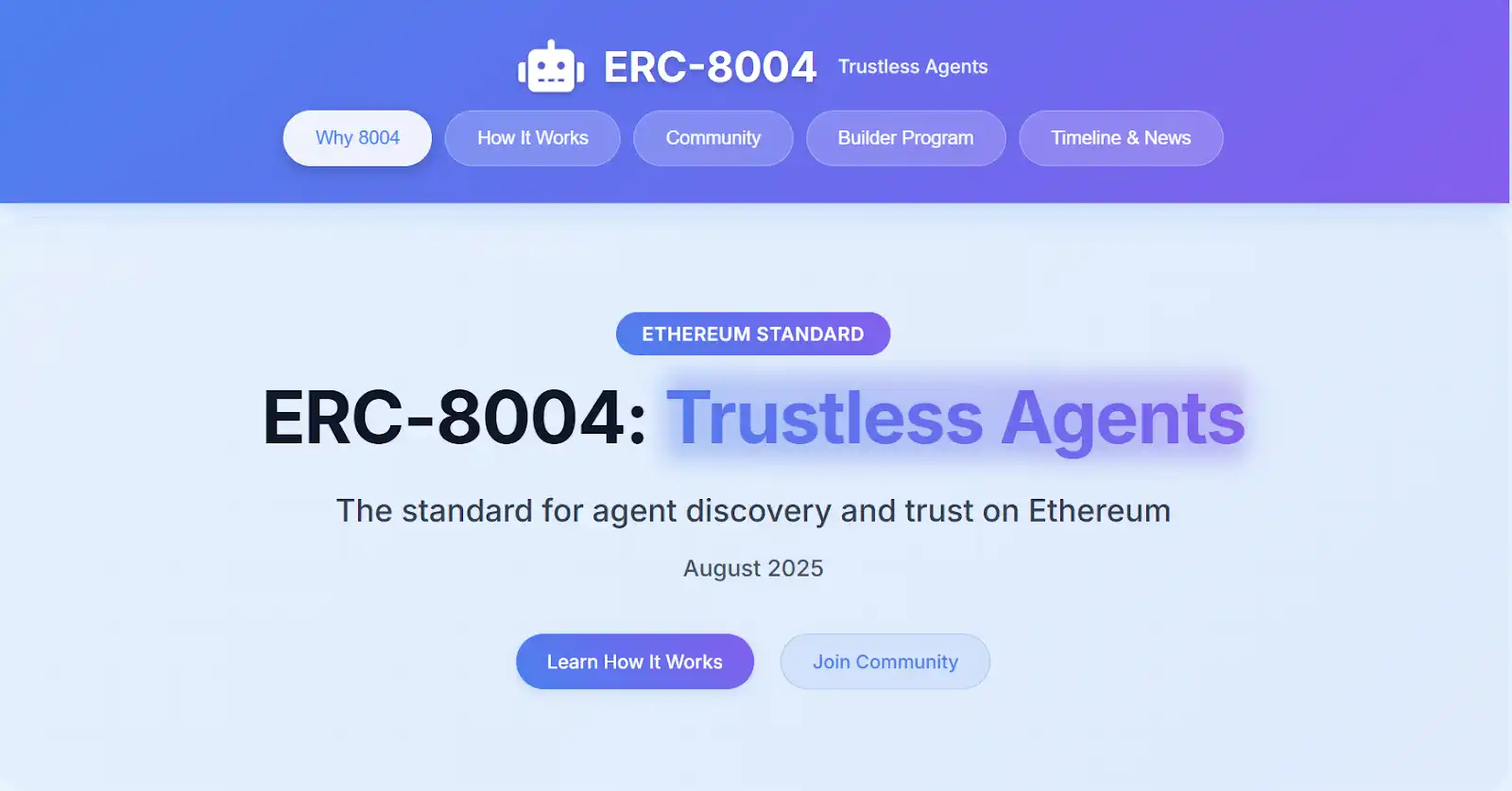
Source: ERC-8004 Official Website
3. ERC-8004: Decentralized Trust Infrastructure for Agents
ERC-8004 serves as the foundational infrastructure of the agent economy. Its core strength lies in using blockchain technology to solve the lack of trusted identity among AI agents, liberating them from centralized platforms and enabling verifiable, cross-platform collaboration.
This system operates through ecosystem contributors supplying trust data: AI developers register unique agent identities; app developers provide ongoing behavioral feedback to build reputation metrics; and validation services act as independent audit providers, delivering on-chain verification of agent results.
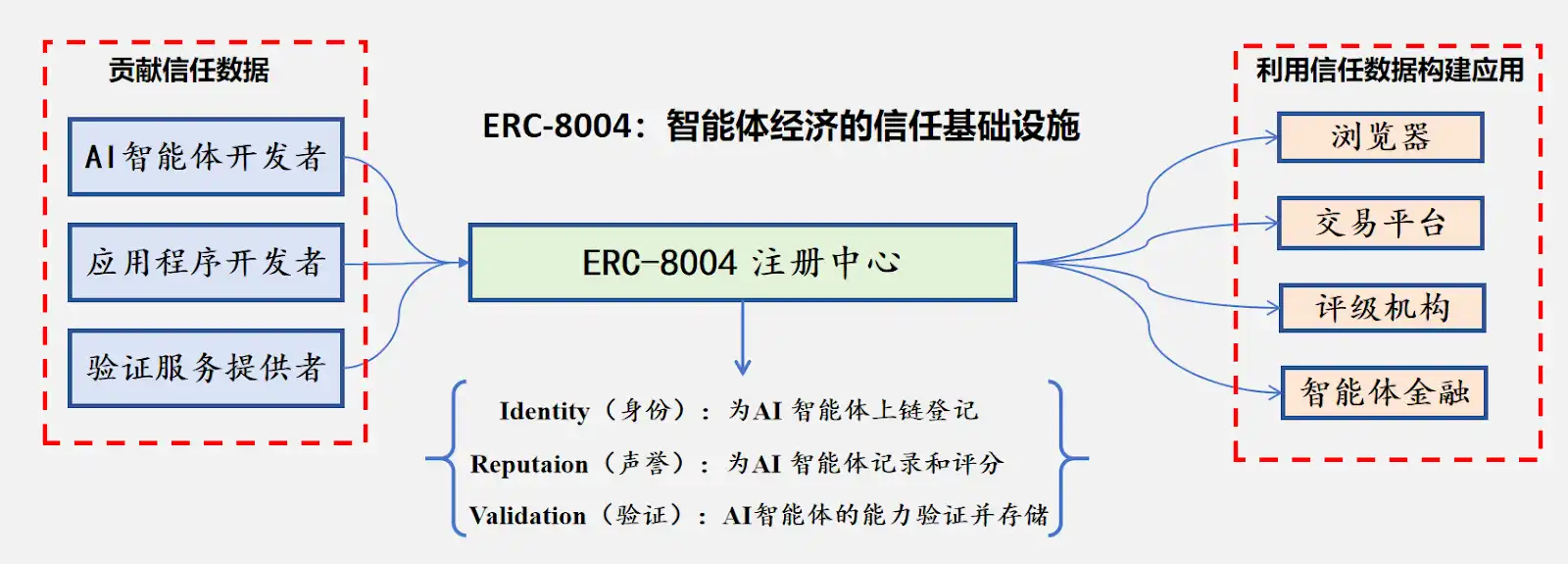
Source: Bitget Wallet, Compiled
All this data flows into the ERC-8004 registry, which aggregates three core protocol functions:
· Identity Registry: Leveraging the ERC-721 NFT protocol, each AI agent receives a unique digital identity. This design allows for transferability and links to a standardized Agent Card, recording the agent’s name, capabilities, and metadata—ultimately enabling permissionless, cross-platform discovery.
· Reputation Registry: Building on identity registration, this decentralized review system lets clients or other agents submit structured feedback. Crucially, these reviews are linked to x402 payment proofs, ensuring only genuine transaction participants can submit feedback—reducing fraud and ensuring transparent reputation data.
· Validation Registry: For high-risk or high-value transactions, agents can request third-party verification through TEE oracles, staked inference, or zero-knowledge machine learning proofs (ZK-ML). These methods deliver cryptographic proof for specific model executions and outputs, creating a verifiable accountability system akin to professional certification in traditional markets.
With ERC-8004’s trusted data layer, an application ecosystem is emerging—including agent discovery browsers (Explorers), marketplaces for reputation-based trading, professional rating agencies, and innovative services such as InfoFi (information finance) and AgentFi (agent finance). These advanced applications are built on trusted agent identities and verification, and support a permissionless, highly collaborative agent services ecosystem.
4. Synergy in Action: The Full Lifecycle of an Agent Transaction
How do these components work together in practice? The complete lifecycle of a decentralized AI agent transaction provides a clear illustration.

Source: Bitget Wallet, Compiled
- First, the requesting agent uses ERC-8004’s identity and reputation registries to discover and assess service provider agents—filtering for those with the required skills and strong reputations.
- Once a match is made, the requester locks payment in a smart contract for financial assurance using the x402 payment protocol.
- The service provider agent then executes the task and undergoes third-party verification. Results are processed on a verifiable computation layer like EigenCompute, generating cryptographic proofs, which a third-party verification agent records in the ERC-8004 validation registry.
- Finally, in the automated settlement phase, the x402 smart contract detects a trusted signature in the ERC-8004 validation registry and, upon confirmation, releases funds to the service provider agent.
Within this closed-loop workflow, ERC-8004 governs access and acceptance, x402 manages payments, and verifiable computation safeguards the process—each layer is indispensable. Unlike x402’s earlier focus on payment tokens, the ERC-8004 ecosystem (see diagram below) spans infrastructure, middleware, and applications across multiple levels.
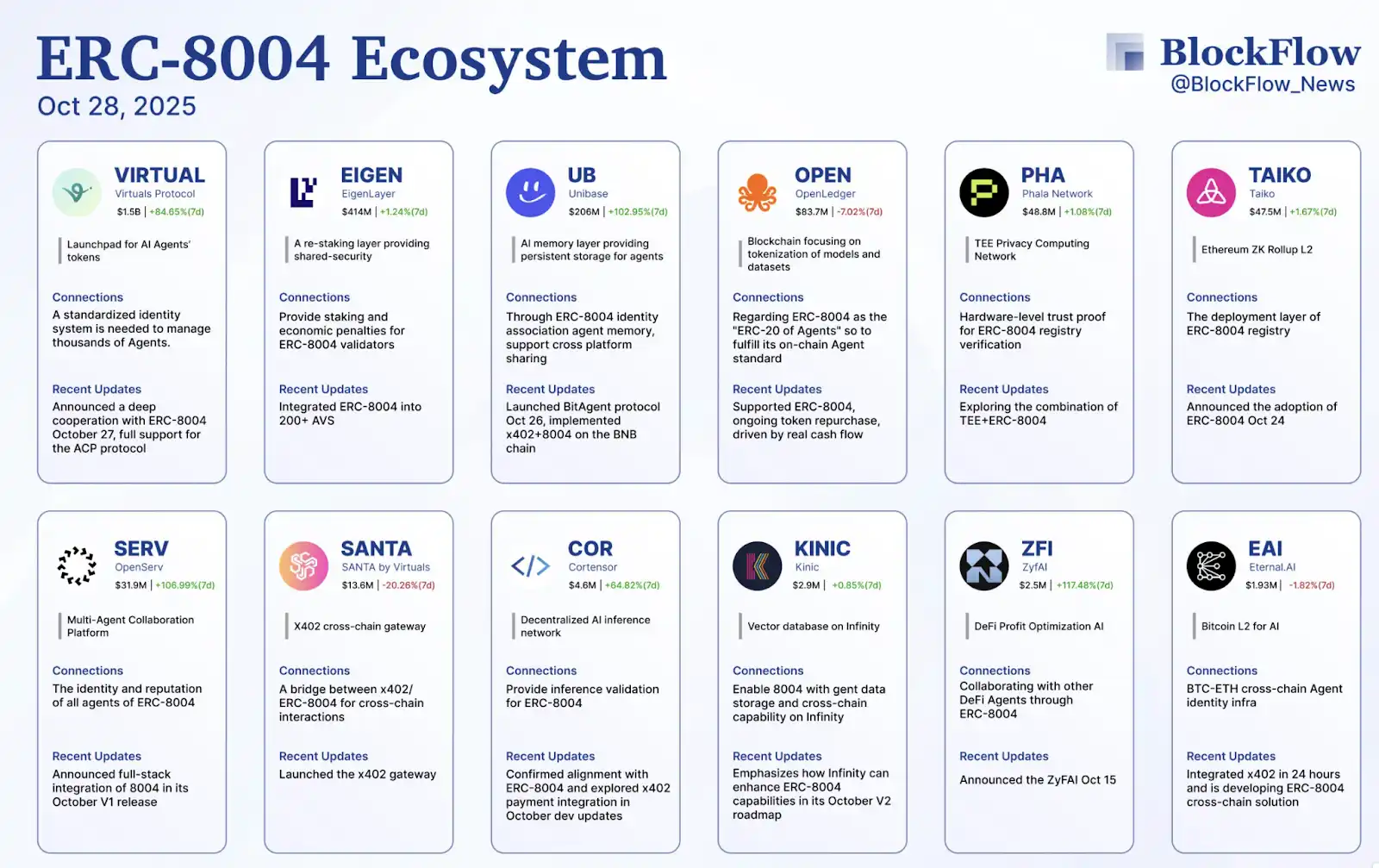
Source: BlockFlow
5. Conclusion: Order and the Future of the Machine Economy
ERC-8004 remains in its early adoption phase—whether its goals for “machine economy identity verification” will be realized depends on market development. The costs and implementation details of third-party verification, along with interoperability with protocols such as x402, are major variables for the future.
Protocols like ERC-8004 mark the machine economy’s transition from unregulated growth to structured order. For the first time, autonomous AI agents have a cross-platform system for identity and credit.
If x402 is the “currency” of the machine economy, then ERC-8004 provides the “passport” and “credit report”—signaling the launch of a permissionless, collaborative, and trustworthy agent services ecosystem.
This article is a submission and does not necessarily reflect the views of BlockBeats.
Disclaimer:
- This article was reprinted from [BlockBeats], with copyright belonging to the original author [Lacie Zhang, Bitget Wallet Researcher]. For any concerns regarding this reprint, please contact the Gate Learn team; the team will promptly handle the matter according to established procedures.
- Disclaimer: The views and opinions expressed herein are solely those of the author and do not constitute investment advice.
- Other language versions of this article are translated by the Gate Learn team. Without explicit mention of Gate, translated articles may not be copied, distributed, or plagiarized.
Related Articles

The Future of Cross-Chain Bridges: Full-Chain Interoperability Becomes Inevitable, Liquidity Bridges Will Decline

Solana Need L2s And Appchains?

Sui: How are users leveraging its speed, security, & scalability?

Navigating the Zero Knowledge Landscape

What is Tronscan and How Can You Use it in 2025?
